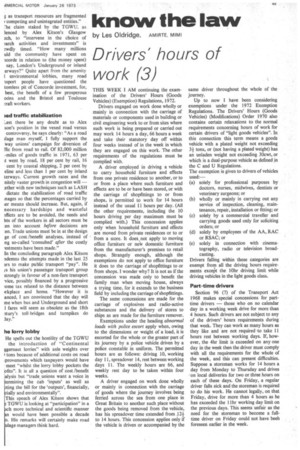know the law
Page 51

If you've noticed an error in this article please click here to report it so we can fix it.
by Les Oldridge, AMIRTE, MIMI
Drivers' hours of work (3)
THIS WEEK I AM continuing the examination of the Drivers' Hours (Goods Vehicles) (Exemption) Regulations, 1972.
Drivers engaged on work done wholly or mainly in connection with the carriage of materials or components used in building or civil engineering work to or from sites where such work is being prepared or carried out may work 14 hours a day, 66 hours a week and take their statutory day off within four weeks instead of in the week in which they are engaged on this work. The other requirements of the regulations must be complied with.
A driver employed in driving a vehicle to carry household furniture and effects from one private residence to another, or to or from a place where such furniture and effects are to he or have been stored, or with the carriage of shopfittings to or from shops, is permitted to work for 14 hours instead of the usual 11 hours per day. (All the other requirements, including the 10 hours driving per day maximum must be complied with.) This concession applies only when household furniture and effects are moved from private residences or to or from a store. It does' not apply to moving office furniture or nev domestic furniture from the manufacturer's premises to retail shops. Strangely enough, although the exemptions do not apply to office furniture it does to the carriage of shopfittings to or from shops. I wonder why? It is not as if the concession was made only to benefit the family man when moving house, always a trying time, for it extends to the business field by including the carriage of shopfittings.
The same concessions are made for the carriage of explosives and radio-active substances and the delivery of stores to ships as are made for the furniture remover.
Exemptions under the heading abnormal loads with police escort apply when, owing to the dimensions or weight of a load, it is escorted for the whole or the greater part of its journey by a police vehicle driven by a police constable in uniform. The permitted hours are as follows: driving 10, working day 11, spreadover 14, rest between working days 11. The weekly hours are 66, and weekly rest day to be taken within four weeks.
A driver engaged on work done wholly or mainly in connection with the carriage of goods where the journey involves being ferried across the sea from one place in Great Britain to another such place without the goods being removed from the vehicle, has his spreadover time extended from l2-
to 14 hours. This concession applies only if the vehicle is driven or accompanied by the
same driver throughout the whole of the journey.
Up to now I have been considering exemptions under the 1972 Exemption Regulations. The Drivers' Hours (Goods Vehicles) (Modifications) Order 1970 also contains certain relaxations to the normal requirements concerning hours of work for certain drivers of "light goods vehicles". In this connection this term means a goods vehicle with a plated weight not exceeding 3+ tons, or (not having a plated weight) has an unladen weight not exceeding 30cwt, or which is a dual-purpose vehicle as defined in the C and U Regulations.
The exemption is given to drivers of vehicles used:—
(a) solely for professional purposes by doctors, nurses, midwives, dentists or veterinary surgeons; or (b) wholly or mainly in carrying out any service of inspection, cleaning, maintenance, repair, installation or fitting; or (c) solely by a commercial traveller and carrying goods used only for soliciting orders; or (d) solely by employees• of the AA, RAC or RSAC; or (e) solely in connection with cinematography, radio or television broadcasting.
Drivers falling within these categories are exempt from all the driving hours requirements except the 10hr driving limit while driving vehicles in the light goods class.
Part-time drivers
Section 96 (7) of the Transport Act 1968 makes special concessions for parttime drivers — those who on no calendar day in a working week drive for more than 4 hours. Such drivers are not subject to any of the drivers' hours requirements during that week. They can work as many hours as they like and are not required to take 11 hours rest between working days. If, however, the 4hr limit is exceeded on any one day in the week then the driver must comply with all the requirements for the whole of the week, and this can present difficulties. Suppose a storeman works for 14 hours a day from Monday to Thursday and drives on local deliveries for two or three hours on each of these days. On Friday, a regular driver falls sick and the storeman is required to do his work. He cannot legally, on that Friday, drive for more than 4 hours as he has exceeded the Ilhr working day limit on the previous days. This seems unfair as the need for the storeman to become a fulltime driver on Friday could not have been foreseen earlier in the week.




























































































